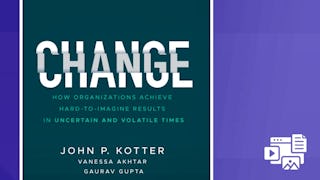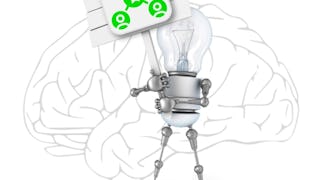- Browse
- Reverting Changes
Results for "reverting+changes"
 Status: Free TrialFree TrialW
Status: Free TrialFree TrialWWesleyan University
Skills you'll gain: Motivational Interviewing, Cognitive Behavioral Therapy, Mental Health Therapies, Behavioral Health, Mental and Behavioral Health, Psychotherapy, Psychology, Experimentation, Health Education, Goal Setting
4.8·Rating, 4.8 out of 5 stars195 reviewsBeginner · Course · 1 - 4 Weeks
 Status: NewNewStatus: Free TrialFree TrialC
Status: NewNewStatus: Free TrialFree TrialCCoursera
Skills you'll gain: Maintainability, Code Review, Test Driven Development (TDD), API Testing, LLM Application, API Design, Microsoft Visual Studio, Software Engineering, Engineering Software, Software Technical Review, Program Development, Application Lifecycle Management, Unit Testing, Microservices, Peer Review, Quality Assessment
Intermediate · Course · 1 - 4 Weeks
 Status: NewNewStatus: Free TrialFree Trial
Status: NewNewStatus: Free TrialFree TrialSkills you'll gain: Root Cause Analysis, Corrective and Preventive Action (CAPA), Process Improvement and Optimization, Performance Measurement, Critical Thinking and Problem Solving
Beginner · Course · 1 - 4 Weeks
 Status: NewNewStatus: PreviewPreviewJ
Status: NewNewStatus: PreviewPreviewJJohn Wiley & Sons
Skills you'll gain: Organizational Change, Business Transformation, Mergers & Acquisitions, Change Management, Digital Transformation, Culture Transformation, Agile Methodology, Adaptability, Organizational Strategy, Business Leadership, Organizational Effectiveness, Strategic Planning, Organizational Structure, Innovation, Leadership, Human Resource Strategy, Business Strategies, Business Strategy
Intermediate · Course · 1 - 3 Months
 Status: NewNewStatus: Free TrialFree Trial
Status: NewNewStatus: Free TrialFree TrialSkills you'll gain: Sprint Retrospectives, Jira (Software), Accountability, Agile Methodology, Issue Tracking, User Feedback, Continuous Improvement Process, Constructive Feedback, Action Oriented, Project Documentation, Taking Meeting Minutes, Prioritization, Record Keeping
Beginner · Course · 1 - 4 Weeks
 Status: PreviewPreview
Status: PreviewPreviewSkills you'll gain: Emotional Intelligence, Cognitive flexibility, Leadership, Team Motivation, Organizational Leadership, Team Building, Leadership Development, Business Leadership, Strategic Leadership, Team Leadership, Initiative and Leadership, Leadership and Management, Adaptability, Empathy, Professional Development, Personal Development, Change Management, Coaching, Visionary, Business Communication
4.9·Rating, 4.9 out of 5 stars14 reviewsIntermediate · Course · 1 - 4 Weeks
 Status: PreviewPreviewU
Status: PreviewPreviewUUniversidade Estadual de Campinas
Skills you'll gain: Data Synthesis, Data Collection, Research, Research Design, Research Reports, Research Methodologies, Quantitative Research, Clinical Research, Peer Review, Statistical Methods, Data Quality, Report Writing, Epidemiology, Statistical Analysis, Qualitative Research, Risk Analysis
4.9·Rating, 4.9 out of 5 stars3K reviewsIntermediate · Course · 1 - 3 Months
 Status: Free TrialFree TrialP
Status: Free TrialFree TrialPPackt
Skills you'll gain: Change Management, Organizational Change, Organizational Development, Leadership and Management, Business Transformation, Business Leadership, Leadership Development, Continuous Improvement Process, Team Performance Management, Emotional Intelligence, Overcoming Obstacles, Stakeholder Engagement, Employee Engagement
4.6·Rating, 4.6 out of 5 stars51 reviewsIntermediate · Course · 1 - 4 Weeks
 Status: NewNewStatus: Free TrialFree Trial
Status: NewNewStatus: Free TrialFree TrialSkills you'll gain: Data Pipelines, Apache Kafka, Operational Databases, Continuous Monitoring, Real Time Data, Data Integrity, Data Warehousing, Data Modeling, Software Versioning, Continuous Integration, Data Validation, Automation, Warehouse Management, Automation Engineering
Intermediate · Course · 1 - 4 Weeks
 Status: PreviewPreviewU
Status: PreviewPreviewUUniversity of Pennsylvania
Skills you'll gain: Influencing, Persuasive Communication, Organizational Change, Change Management, Overcoming Obstacles, Cognitive flexibility, Behavioral Economics, Decision Making, Critical Thinking
4.9·Rating, 4.9 out of 5 stars474 reviewsBeginner · Course · 1 - 4 Weeks
 Status: NewNewStatus: Free TrialFree TrialH
Status: NewNewStatus: Free TrialFree TrialHHarvard Business Review
Skills you'll gain: Crisis Management, Organizational Change, Strategic Leadership, Leadership, Resilience, Team Leadership, Organizational Leadership, Dealing With Ambiguity, Change Management, Adaptability, Overcoming Objections, Compassion, Emotional Intelligence, Process Improvement, Empathy, Communication Strategies, Employee Engagement
Intermediate · Course · 1 - 4 Weeks
 Status: NewNewStatus: Free TrialFree TrialS
Status: NewNewStatus: Free TrialFree TrialSSimplilearn
Skills you'll gain: Kanban Principles, Lean Six Sigma, Project Closure, Six Sigma Methodology, Return On Investment, Process Improvement, Lean Methodologies, Quality Improvement, Business Metrics, Production Process, Continuous Improvement Process, Operational Excellence, Statistical Process Controls, Workflow Management, Risk Control, Financial Analysis, Project Controls, Cost Benefit Analysis, Operational Analysis, Visual Design
Beginner · Course · 1 - 4 Weeks
In summary, here are 10 of our most popular reverting+changes courses
- Creating Behavioral Change: Wesleyan University
- Refactor and Test LLM Microservices: Coursera
- Resolve Recurring Issues with Continuous Improvement: Coursera
- Change Management and Organizational Transformation: John Wiley & Sons
- Jira for Effective Retrospective Actions: Coursera
- Conscious Leadership: Adapting to Changing Situations: Ei4Change
- Revisão Sistemática e Meta-análise: Universidade Estadual de Campinas
- Change Management: Packt
- Manage Schema Evolution in Real‑Time Data: Coursera
- Removing Barriers to Change: University of Pennsylvania










